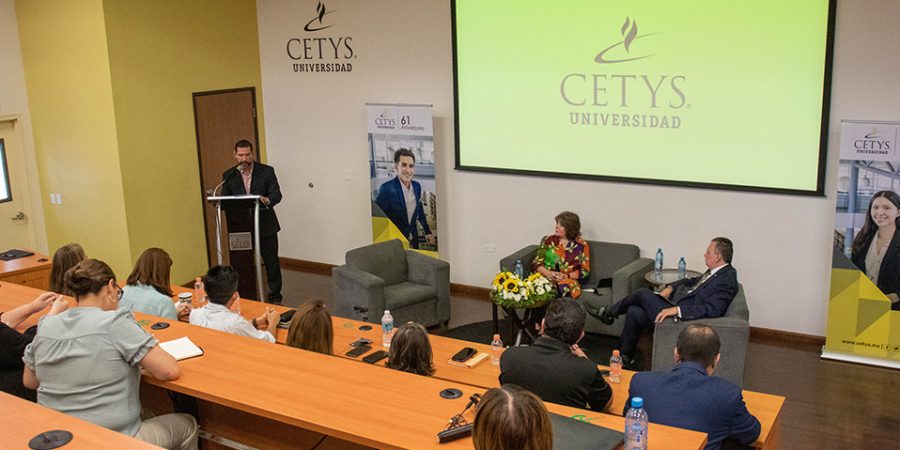A discussion was held to analyze the proposal to create a national system for the evaluation and accreditation of higher education in Mexico. Experts from Colombia and Mexico analyzed the challenges and threats that its implementation would imply. This was part of the commemorative event for the 61st Anniversary of CETYS University.
The event was organized by the Faculty of Social Sciences and Humanities. Attending the meeting were Dr. Diego Mauricio Mazo-Cuervo, President of CEIPA Business School of Colombia, as well as Dr. Sonia Bacha-Baz, Director of the Accreditation System of the Federation of Private Mexican Institutions of Higher Education (FIMPES). The event was held in the Santander Universidades Room of CETYS University International Campus in Ensenada.
Mexico does not have a national accreditation system. There are institutional program accreditors and student trajectory certifiers, which were created in the 1980s and 1990s. They are not governed by the State, and the institutions themselves voluntarily decide to become accredited, said Dr. Sonia Bacha.
“The accrediting agencies were created between 1989 and 1990; they are not run by the State. FIMPES was born in 1982, and in 1994 the first institutional accreditation was carried out. The system has grown, but the universities voluntarily decide to be accredited or not,” highlighted Dr. Sonia Bacha.
In Colombia, there is a national quality assurance system that has two pillars, one is the qualified registry, and the other is high-quality accreditation, which is divided into two: program accreditation and institutional accreditation. The basis is the qualified registry, but everything is national, said Dr. Diego Mauricio Mazo-Cuervo, President of CEIPA Business School.
“Accreditations in Colombia are voluntary, cost-free, and the government grants some benefits, but the process requires a great effort due to the quality requirements and the standards that must be met; the process itself is exhausting. Colombia currently has 300 Educational Institutions of Higher Education, of which 28% are accredited in high quality.
Regarding the risks that evaluations and accreditations are mediated by the government, Dr. Sonia Bacha-Baz assured that creating a national system implies knowing the characteristics of public and private institutions; “Lacking such knowledge will be a risk because there are many factors involved. This applies to any government because in Mexico there are 3,000 universities with different characteristics” emphasized Dr. Sonia Bacha.
In this sense, Dr. Diego Mauricio Mazo mentioned that in Colombia the problem is the evaluation standards and how they are applied to institutions with different characteristics. «The problem is how to apply the same standards to different institutions; these cases get complicated and become more complex when evaluating.»
Finally, regarding best practices, both share that the evaluation and accreditation processes are very important for any institution; that they are not only momentary, on the contrary, and that they must migrate to a process of continuous improvement as an input to close gaps and achieve objectives, in addition to the fact that it must become something cultural that permeates the entire institution, explained the Director of the FIMPES Accreditation System.
Currently, 113 private universities are part of FIMPES, of which 93 are accredited. This makes it possible to guarantee the educational quality of its students and boost their efforts to work on continuous improvement in favor of the country’s educational development.
The event was attended by Dr. Alberto Gárate-Rivera, Academic Vice President, on behalf of Dr. Fernando León-García, President of CETYS University, who thanked the academic experts for their participation in the 61st-anniversary events.









Leave your comment